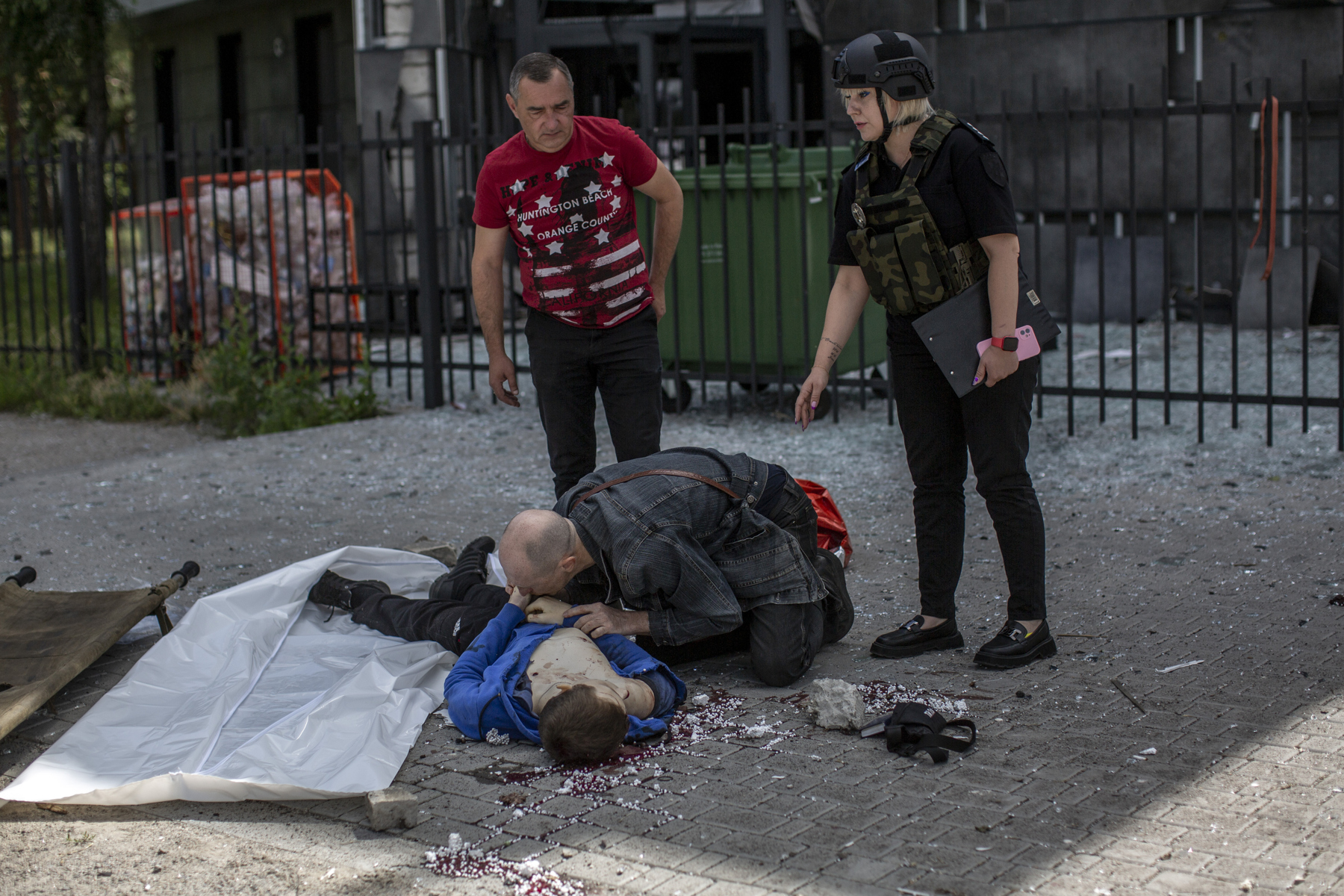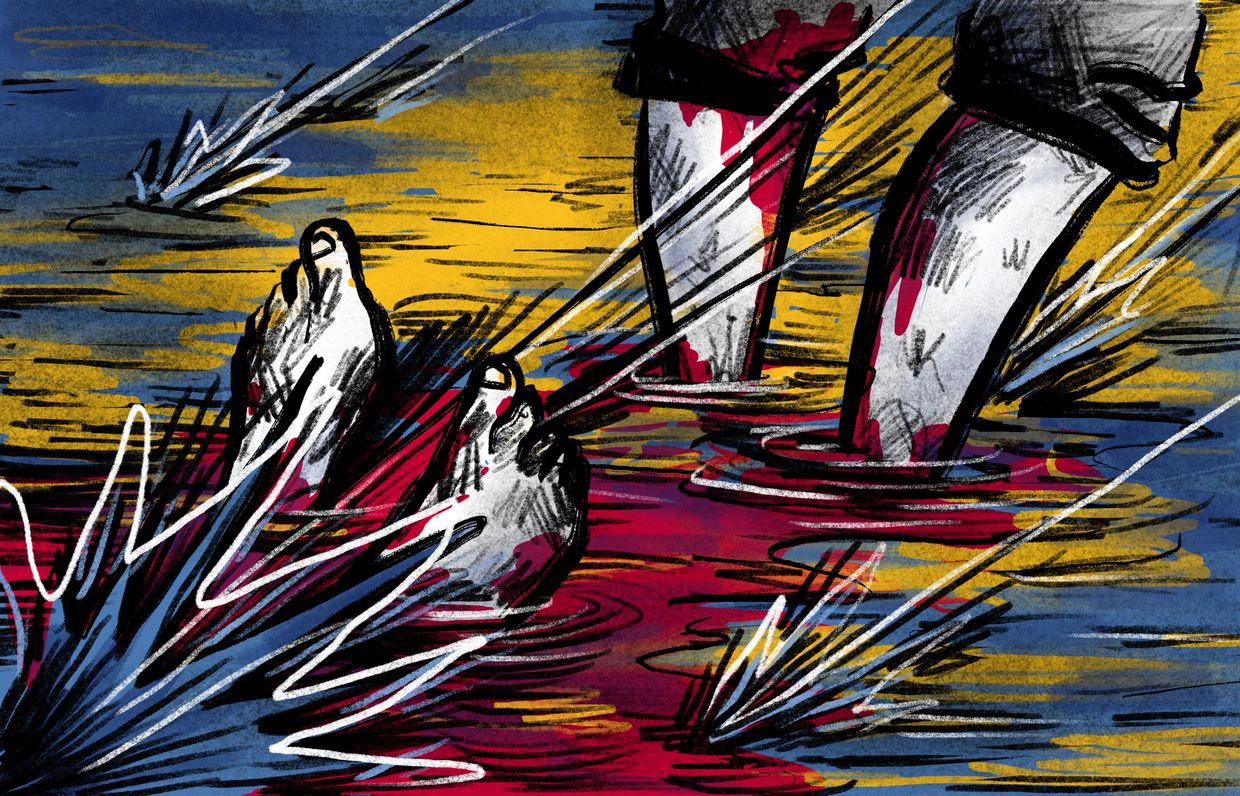How Russian troops killed 3 unarmed teenagers in Ukrainian village

WARNING: The story contains graphic descriptions.
When the neighbor told her what happened to her brothers, Tetiana Zahatna's howl echoed across the village.
The twins had stepped out of the house earlier. Then she heard the shooting. Though Russian forces never occupied the village of Mokhnatyn in Chernihiv Oblast, their patrols used to pass through it all the time at the beginning of the full-scale invasion.
Zahatna sprinted to the place where the sounds of gunfire came from, falling and scraping her knees along the way.
The blood-soaked bodies of Yevhen and Bohdan Samodii, both 17, and their friend Valentyn Yakymchuk, 18, were lying in the road.
"I ran up to Yevhen, but he was already cold," Zahatna, 28, told the Kyiv Independent. Valentyn was gone too, his body so wrecked by bullets that the locals covered it with their jackets. Bohdan was still clinging to consciousness, barely speaking.
"I realized that we could not save Yevhen, but we needed to do everything to save Bohdan.” Zahatna said she begged him to hold up as her family packed him into a car to take him to a hospital in Chernihiv, 23 kilometers away.
"He promised me he’d make it," Zahatna cried.
But the car came back an hour later. Bohdan died on the way.
Eyewitnesses later told Zahatna that her brothers raised their hands as soon as they saw the convoy. But Russians in the armored personnel carriers killed them anyway.
"They were my everything," Zahatna wept. "Dearer than anything else."
The Samodii brothers are among over 500 Ukrainian children who were killed by the Russian army after the beginning of the full-scale invasion on Feb. 24, 2022, according to the Prosecutor General’s Office. The brothers’ murder is documented in the 2022 report by the Office of the United Nations High Commissioner for Human Rights (OHCHR).
Like in many other such cases, establishing the perpetrators of the boys’ killing and bringing them to justice can be extremely difficult.
Start of the battle
Zahatna and her brothers were very close. She, her young son Tymur, and the twins lived with their mother and stepfather in one house in Mokhnatyn. They did everything together since childhood, "cleaning, playing, watching movies," Zahatna said.
While their physical features were almost indistinguishable, the twins differed in character: Yevhen was more hot-tempered than Bohdan. Still, both had very positive outlooks and many friends, including Valentyn.
They dreamed of becoming jewelers and studied at one of the lyceums in the regional capital of Chernihiv, Zahatna says. The twins returned home two weeks before the full-scale invasion. After she woke up to explosions on Feb. 24, 2022, Zahatna wanted to evacuate her son and brothers to Poland, where their father resides.

But the uncertainty of the moment prevented them from leaving the village. The family only relocated to their grandmother's house, where they could take shelter from Russian attacks in the cellar in her yard.
Zahatna saw the first Russian convoy drive through the village on Feb. 26, as the battle of Chernihiv unfolded. The Russians never managed to take the city before being forced to withdraw from the north.
"Across the field, we saw them launching attacks on Chernihiv," Zahatna said. "We heard everything perfectly."
Her hands still shake when she remembers. At one point, some Russians plundered the store where her mother worked.
A couple of days before the tragedy, Zahatna had a nightmare that left her deeply anxious about the safety of her loved ones.
She hoped that it was just a dream.
'Blood-soaked bandages'
On March 14, 2022, Yevhen and Bohdan needed to deliver some oil to their neighbor as a thank-you for the bread she gave the family earlier. Valentyn came with them.
Knowing that Russian forces frequently passed through the village, the twins’ grandfather repeatedly cautioned the boys to "avoid the roads and go through the gardens" whenever they needed to travel anywhere.
Before heading out, they asked their sister to prepare food for when they got back. As she was cooking, Zahatna heard the shooting.
"It sounded as if someone knocked on the door very loudly," Zahatna says. She took her son and grandparents to the cellar just before Russian troops drove along their street.
She sensed deep within that something terrible had happened. Zahatna ran out of the cellar and yelled at the convoy, but they drove quickly and did not react.
She hurried out of the yard, searching for her brothers. Shortly, Zahatna was approached by a local man, telling her the words that divided her life into before and after: "They were shot."
"I asked him: 'Who was shot?' and he said: 'Your brothers and Valentyn.'" He remained silent when Zahatna asked whether they survived. The whole village must have heard her scream, she says.
Halfway to the site of the shooting, she saw the boys' friend Mykhailo, drenched in blood. As it turned out later, he was the first one who arrived at the scene and tried to stop their bleeding.
When Zahatna, her mother, and stepfather found the boys, it was already too late to save Yevhen and Valentyn.
Yevhen had a "big hole in his chest." Valentyn’s leg was mutilated and his skull was broken.
Zahatna stayed by the body of her dead brother as her parents drove Bohdan to the hospital in Chernihiv. Due to the number of military checkpoints on the road, the trip took much longer than usual.
Despite the family's prayers and hopes, the boy died en route.
"I ran towards the car very fast, but when I saw his body on the back seat… It was as if my strength had drained away, and everything crumbled."
The 2022 report by the Office of the United Nations High Commissioner for Human Rights (OHCHR) bears out Zahatna’s story. It says the boys "stopped on the side of the road as they saw the column approaching." The point vehicle stopped, "aimed its cannon at the 18-year-old, and opened fire."
"The victim was killed instantly, with the force of the impact tearing parts of his body away," reads the report.
"The two boys froze on the side of the road and raised their hands in surrender. Russian soldiers emerged from other armored vehicles in the column and shot both boys with small arms."
Soon after the tragedy, the Chernihiv Oblast Prosecutor’s Office started an investigation into the boys’ killing, suspecting a violation of the laws and customs of war, combined with intentional murder.
More than 1.5 years later, the investigation is still ongoing. The prosecutors’ press service told the Kyiv Independent that they cannot disclose any details about the suspects.
Ending three innocent lives, Russian troops caused unimaginable anguish for their families.
Zahatna recalls bringing blood-soaked bandages used to cover her brothers' wounds to their father in Poland.
"He kissed those bandages and cried over them…"














